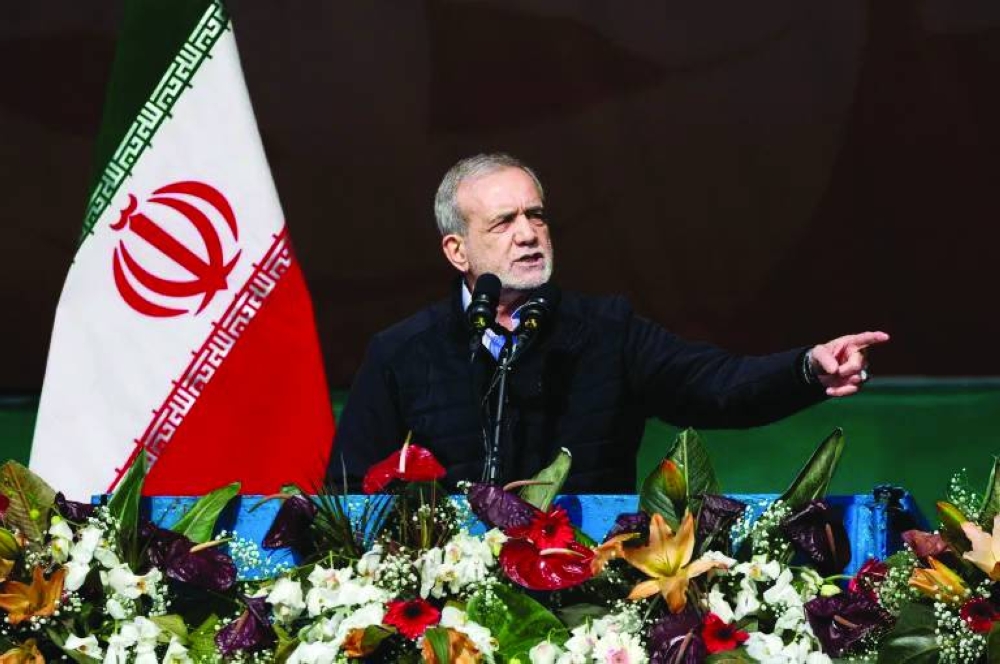President Masoud Pezeshkian said Iran would not negotiate with the US while being threatened, telling President Donald Trump to "do whatever the hell you want", Iranian state media reported on Tuesday.
"It is unacceptable for us that they (the US) give orders and make threats. I won't even negotiate with you. Do whatever the hell you want", state media quoted Pezeshkian as saying.
Iran's Supreme Leader Ayatollah Ali Khamenei said on Saturday that Tehran would not be bullied into negotiations, a day after Trump said he had sent a letter urging Iran to engage in talks on a new nuclear deal.
While expressing openness to a deal with Tehran, Trump has reinstated the "maximum pressure" campaign he applied in his first term as president to isolate Iran from the global economy and drive its oil exports down towards zero.
Iran's mission to the United Nations had indicated Sunday that Tehran might be open to talks aimed at addressing US concerns about the potential militarisation of its nuclear programme -- though not to ending the program completely.
But on Monday, Iran's top diplomat seemed to slam the door on such discussions, saying Tehran's nuclear programme was and always will be entirely peaceful and so there was "no such thing as its 'potential militarization'".
"We will NOT negotiate under pressure and intimidation. We will NOT even consider it, no matter what the subject may be," foreign minister Abbas Araghchi said on social media platform X.
Since returning to the White House in January, Trump has reinstated his policy of exerting "maximum pressure" against Iran, reimposing sweeping sanctions aimed at crushing its oil industry in particular.
The US State Department said Sunday the decision not to renew Iraq's sanctions waiver was made to "ensure we do not allow Iran any degree of economic or financial relief."
Iran supplies a third of Iraq's gas and electricity, providing Tehran with substantial income.
On Sunday, the Iranian mission to the United Nations had sounded a more conciliatory note, suggested Tehran might be willing to discuss certain issues.
"If the objective of negotiations is to address concerns vis-a-vis any potential militarization of Iran's nuclear program, such discussions may be subject to consideration," said a statement from the mission.
"However, should the aim be the dismantlement of Iran's peaceful nuclear program to claim that what (President Barack) Obama failed to achieve has now been accomplished, such negotiations will never take place," it said.
The waiver for Iraq was introduced in 2018, when Washington reimposed sanctions on Tehran after Trump abandoned a nuclear deal with Iran negotiated under Obama.
A spokesman for the US embassy in Baghdad on Sunday urged Baghdad "to eliminate its dependence on Iranian sources of energy as soon as possible."
"The President's maximum pressure campaign is designed to end Iran's nuclear threat, curtail its ballistic missile program, and stop it from supporting terrorist groups," the spokesman said.
The landmark 2015 deal that Obama helped negotiate between Tehran and major powers promised sanctions relief in return for Iran curbing its nuclear programme.
Tehran, which denies seeking nuclear weapons, initially adhered to the nuclear deal after Trump pulled out of it, but then rolled back commitments.
US officials estimate Iran would now need mere weeks to build a nuclear bomb if it chose to.
Trump pulled out of the agreement over the objections of European allies, instead imposing US sanctions on any other country buying Iran's oil. The waiver was extended to Iraq as a "key partner" of the United States.
Iraq, despite having immense oil and gas reserves, remains dependent on such energy imports. But Baghdad said it had prepared "for all scenarios" regarding the waiver.
The ending of the energy waiver is expected to worsen the power shortages that affect the daily lives of 46 million Iraqis.
Gulf analyst Yesar Al-Maleki of the Middle East Economic Survey said Iraq will now face challenges in providing electricity, especially during summer.
To alleviate the impact, Iraq has several options including increasing imports from Turkey.

"It is unacceptable for us that they (the US) give orders and make threats. I won't even negotiate with you. Do whatever the hell you want", state media quoted Pezeshkian as saying.
